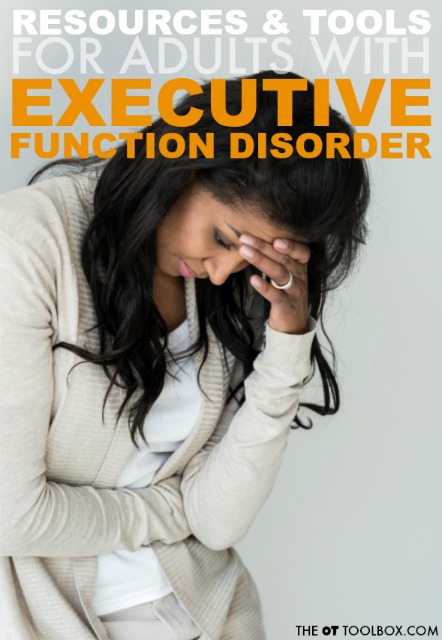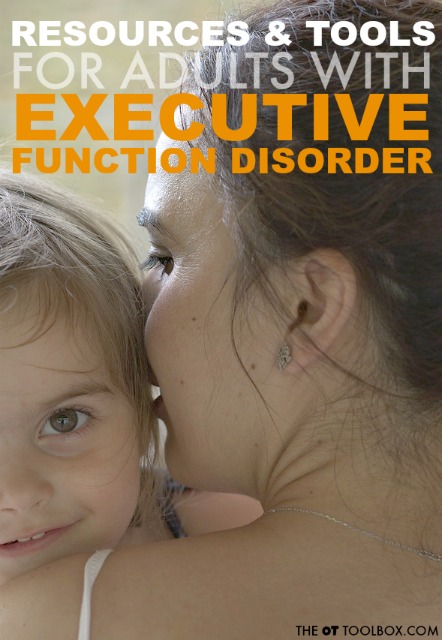
Colleen Beck, OTR/L is a pediatric occupational therapist and the owner and author of The OT Toolbox website. She manages all of The OT Toolbox social media accounts and runs the popular newsletter. Colleen created The OT Toolbox in 2011 and since then has written thousands of blog posts designed to support therapy providers, educators, parents, counselors, admin, and caregivers in promoting the healthy development of kids. Check out Colleen's blog posts below:
Here, you will find tools and information for adults with executive function disorder and executive functioning issues that impact day to day tasks in adulthood. For adults, executive functioning skills are a part of everything we do. The ability to use these skills with mental dexterity impacts the way we pay attention, focus, plan, and prioritize. Here, you’ll find strategies that can impact executive functioning needs so that organization, impulse control, planning, time management, and other executive functioning skills are improved and regulated in daily life tasks.
Now you might be thinking, “Executive function disorder?! I don’t have a disorder!” And that is probably the case in most instances for those reading this article. However, there are many of us who struggle on a day to day basis with things like getting started on chores or problems (task initiation), staying focused (attention), losing things constantly (organization), getting out of the house on time on a regular basis (task completion), and a variety of other challenges that impact our lives and generally stress us out. These are not the components that define a disorder, but they are executive functioning challenges that impact day to day life. It’s my hope that this resource offers tools to make the overall wellbeing better, and to offer tools for adults with executive function challenges easier! Let’s break down executive functioning skills in adults and take a look at how things like focus, attention, organization impact life skills in adulthood.
My daughter has battled Executive Function Disorder all of her life, but right now, it is really preventing her from moving forward with her life. Things like completing a task, making decisions, time management, and projecting ahead are SO HARD. Is there anything that can help my adult daughter struggling with executive functioning disorder?
Does this sound at all familiar? So often, executive functioning challenges are present in adults but we don’t stop and think, this isn’t how things have to be. In fact, there are everyday challenges that are very difficult for adults with executive functioning needs. Things like organization, planning, and flexible thinking can be a real struggle that impacts family life, work life, personal relationships, and the things we need to do every day. As kids with these challenges move into adulthood, some areas that we might expect to develop just never seem to change. It’s not uncommon; the fact is that executive functioning skills are a very broad set of skills. Forgetting things, difficulty with inhibiting behaviors or actions, trouble with planning big projects, or staying organized in the daily life of an adult…everyone deals with these challenges at one time or another. The challenges become a problem when social, emotional, intellectual, or organizational aspects are disrupted. A person’s career/job/family life/etc. can be devastated by difficulties with executive functioning skills. Difficulties with the higher-level cognitive skills that make up executive function can impact adults by limiting one’s ability to “connect the dots” and can impact other areas of executive functioning as well. For the adult with executive function disorder, challenges can present in many different ways. There may be no trouble with impulsivity or attention struggles, however other mental skills can be quite difficulty. Sometimes, seeing the “big picture” is the problem. For others, it’s just making decisions. Still others lack time management and have difficulty with multi-tasking.

When you think about the life changes that happen between high school graduation to accomplishing all of these high-level executive functioning skills, you can see how there is a developmental change that occurs between the ages of 18-25.
In order to complete high-level thinking and planning tasks, adults require development of several executive functioning areas:
For other adults who may have always struggled with seeing the big picture, planning tasks, or staying focused on a task, this is the typical development for that individual. In other words, some adults may be gaining improvements and strengthening the skills they’ve got, just at a lower level than another adult. In these cases, strategies and tools can make a difference here, too.
We are distracted by many things, and that level of distractibility is impacted by advances in screens, stimuli around us, faster lifestyles, more options, and increasing availability of information.
Some good resources to check out on adults and distractibility include:
Below, you will find curated information from around the web that will be instrumental in making an effortful improvement in executive functioning needs. Read through this information and use it as best fits the needs you or an adult with executive functioning challenges might be experiencing.
Remember that everyone is different in their strengths, weaknesses, needs, interests, and experiences. This information is not intended to treat or address specific needs, but rather, as educational material. Seek professional help when needed.
The is fact that adult executive functioning impacts everything we do as adults. Take a look at this adult executive functioning skill checklist.
Some of these problem areas for adult executive functioning issues may include:
It’s easy to see how the list above can look so different for different people, especially when considering aspects such as job requirements, family obligations, outside situations or other issues that may make a difference in the occupational performance of an individual.
Executive functioning kills and emotional regulation are closely related. Playing a role in the ability to function and complete day-to-day tasks is the role of the limbic system when it comes to executive functioning skills. Managing emotions, and emotional regulation can greatly impact the adult with executive function challenges.
These structures and their hormones control functions such as emotions, behavior, motivation, sleep, appetite, olfaction, stress response. In adults, the role of the limbic system impacts household tasks completed, grocery shopping, paying bills, getting to work on time, caring for children and other daily life tasks.
This is really interesting, because you may connect the dots with this list and see that social emotional skills, executive functioning, inner drives, and sensory processing (including the sense of smell and interoception) all centered in one place in the brain! (This is not to say that these are the only places in the brain that operate these functions as well.) All of this can be considered when addressing needs using a specific sensory diet for adults that center on the areas of needs for the individual struggling with executive functioning skills.
You can see how the role of emotions and regulating daily stressors impacts attention, organization, task initiation, task completion, and problem solving.
Generally speaking, the limbic system is the emotional brain but this piece of the EF puzzle has a huge role for adults who are expected to act…like adults!

Some easy to apply tools can impact executive functioning challenges in adults. These strategies include low-tech or high-tech strategies such as:
Here are some symptoms of executive function disorder in adults. Some of the symptoms include time blindness, self-motivation, and an inability to keep future events in mind. Do these symptoms sound familiar?
One symptom that is mentioned is the regulation of one’s non-verbal working memory, or our inner critic. This is an area that can be detrimental to some, especially when self-conscious of weaknesses that impact life choices or struggles. Here is one simple strategy for self-talk in kids, but can be morphed into an age-appropriate version for adults.
If an adult or someone who is trying to help an adult with executive function needs would like to look into testing, here is a self-test that may help with self-awareness of the problems that can easily be addressed through strategies and tools. Use this information to move forward with professional help if necessary.
Another article that can “bring to light” some of the concerns with executive functioning needs is this article about the day in the life of an adult with EFD. It really highlights the challenge of managing other people’s schedules, the workplace juggling act, and managing relationships.
Time management tools, including simple planners and time management apps can be helpful. Here are more tools for addressing time management and other tools such as motivation, scheduling, prioritization, and other challenges.
This article discusses ADHD, but a lot of the tips and strategies can carryover to any need with planning ahead.
Finally, remember that many of the executive functioning strategies that are out there and presented in books can be used just as easily and seamlessly by adults. The same strategies that work for keeping track of homework tasks by a child can be used by an adult who needs to manage bills and important papers.
The Impulse Control Journal is your guide to addressing the underlying skills that play into trouble with planning and prioritization.
The journal is an 80 page collection of worksheets and prompts to discover what’s really going on behind executive functioning skills like planning, organization, prioritization, working memory, and of course, impulse control.
While the guide was developed for students of all ages, this printable workbook is perfect for adults, too. It can help you discover strategies that make a real impact for all of the skills needed to get things done.
Here’s the thing; Everyone is SO different when it comes to struggles related to executive functioning and everyone’s interests, needs, challenges, strengths, and weaknesses are different too. All of these areas play into the challenges we see on the surface. And, this is where the Impulse Control Journal really hits those strengths, weaknesses, and challenges where it matters…in creating a plan that really works for kids of all ages (and adults, too!)
Check out the Impulse Control Journal, and grab it before the end of February, because you’ll get a bonus packet of Coping Cards while the journal is at it’s lowest price.
Read more about The Impulse Control Journal HERE.
The Impulse Control Journal has been totally revamped to include 79 pages of tools to address the habits, mindset, routines, and strategies to address impulse control in kids. More about the Impulse Control Journal:
This is a HUGE digital resource that you can print to use over and over again.